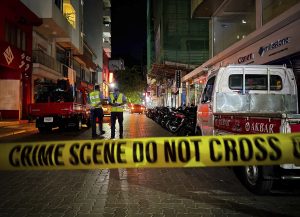Recently, the Maldives has garnered significant media attention due to its government’s escalating tensions with India and increasing engagement with China. However, media and pundit speculation about a potential shift in Maldivian foreign policy, moving from an “India First” approach to a more China-leaning stance, has overshadowed an important domestic development: the decision of the Muizzu administration earlier this month to facilitate the repatriation of 21 Maldivian nationals from five families who had been residing in a refugee camp near the Turkey-Syria border.
This group primarily consists of widows and children of foreign terrorist fighters who had previously left the Maldives for Syria to join the country’s civil war.
The repatriated group includes five women, 15 children, and one man, who were brought back on a government-chartered flight from Turkey. They arrived in the Maldives on the morning of January 16 and are now housed in the National Reintegration Center (NRC). Under the country’s Anti-Terrorism Act, they will undergo assessments to determine their eligibility for rehabilitation or whether they will face criminal charges. Maldivian law prohibits citizens from traveling to foreign conflict zones without authorization.
During a press conference, Ali Ihusan, the Maldives’ minister of homeland security and technology, emphasized the government’s commitment to repatriating all Maldivian nationals stranded in foreign conflict zones. He described the decision of the families to travel to Syria as influenced by misinformation and extremist rhetoric, portraying them more as victims than as criminals. Additionally, he assured that the National Reintegration Center (NRC) is well-equipped with the necessary resources and staff to effectively rehabilitate them.
Given the sensitive nature of the issue and the involvement of minors, details regarding the individuals’ roles in the conflict and the specifics of their rehabilitation programs have been limited.
Currently, it is estimated that over 100 Maldivians, consisting of widows and children of deceased foreign terrorist fighters of Maldivian origin, are living in refugee camps near the Turkey-Syria border. Some of these individuals have reached out to relatives in the Maldives, using them as intermediaries to request government assistance for repatriation.
Under President Ibrahim Mohamed Solih (2018-2023), the Maldives decided to facilitate the repatriation of all its nationals stranded in war zones, a policy continued by the current administration. This decision includes a commitment to ensure that returnees undergo necessary deradicalization programs, aiming to rehabilitate them and prevent the spread of extremist views within the general population. Additionally, if required, they would face criminal charges. To achieve these objectives, the Solih government significantly amended the country’s anti-terrorism legislation and established the NRC to temporarily house returnees
However, the country has encountered numerous challenges in the repatriation process. These challenges include difficulties in finding adequately trained staff for the facility and verifying the Maldivian nationality of minors who were conceived and born in war zones. Previously, due to legislative limitations, the Maldives did not accept DNA evidence as proof of paternity or maternity. Despite these obstacles, in 2022, the NRC successfully rehabilitated a repatriated family, which included a 33-year-old woman and her four children. The rehabilitation process took approximately one year, and the family is now reported to be living “normal lives.”
Key questions being discussed at the policy level and among the public include the pace of further repatriations, the effectiveness of rehabilitation efforts, and the appropriate treatment of returnees, whether as criminals or victims. Regardless of the conclusions reached in these discussions, the Maldives faces a broader challenge in responding to the rise of religious extremism.
There is an urgent need to understand the allure of extremist ideologies, the factors that drive individuals to participate in foreign conflicts, and the willingness of some radicalized individuals to commit acts of violence both within the Maldives and in foreign conflict zones. Alarmingly, from 2013 to 2018 coinciding with the administration of former President Yameen Abdul Gayoom, the Maldives had the grim distinction of having the world’s highest per capita rate of its citizens joining foreign terrorist groups — over 250 from a population of less than 500,000. Many were initially emboldened by the Islamic State’s 2014 declaration of a caliphate; several have since been killed, including by rival terrorist groups.
Domestically, the Maldives has experienced a series of increasingly brazen and violent terrorist acts. In 2021, there was an assassination attempt on the then-Speaker of Parliament, former president, Mohamed Nasheed, using a homemade bomb. Extremists, angered by Nasheed’s liberal and progressive views, which they deemed un-Islamic (‘laadheenee‘), carried out this attack. In 2017, liberal journalist and blogger Yameen Rasheed was brutally murdered in his building’s stairwell, likely for his outspoken liberal views.
Journalist Ahmed Rilwan, who disappeared in 2014, is suspected to be a victim of religious extremism. In 2012, Dr. Afrasheem Ali, a parliamentarian and religious scholar known for his moderate views, was murdered in a suspected religiously-motivated attack. Additionally, in July 2023, the United States Treasury Department blacklisted nearly 30 Maldivian companies suspected of financing terrorist entities including al-Qaida and the Islamic State.
Thus, as the Maldives confronts the challenges of repatriation and stemming the flow of terrorist fighters, it becomes clear that these are symptoms of a much wider issue of religious extremism, a problem that successive Maldivian administrations have struggled to fully address.

































